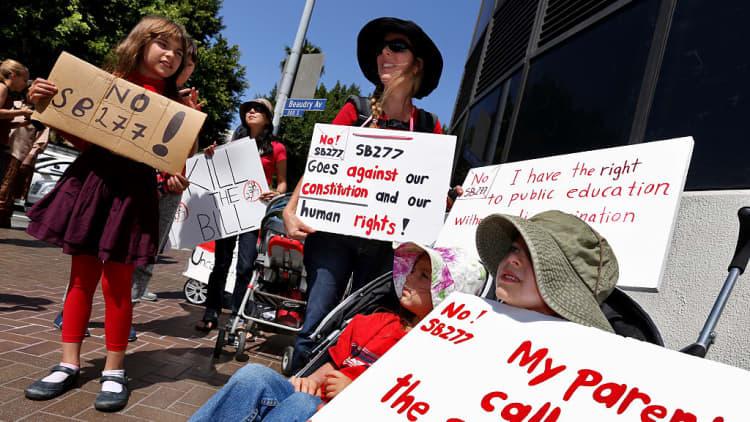There's no link between autism and the vaccine that prevents measles, mumps and rubella, according to a new study that challenges a push by some parents against vaccinating their children.
The study in Denmark is one of the largest research projects examining the issue. It comes as states face measles outbreaks that many health officials are blaming on the so-called anti-vaxxer movement.
"The study strongly supports that MMR vaccination does not increase the risk for autism, does not trigger autism in susceptible children, and is not associated with clustering of autism cases after vaccination," the authors wrote in the study published this week in the Annals of Internal Medicine.
Researchers studied over 650,000 children born in Denmark from 1999 through 2010 and used Danish population registries to gather information on vaccinations, autism diagnoses and other risk factors, such as if the child had a sibling diagnosed with autism.

Children who were vaccinated were not more susceptible to autism and did not develop it at a higher rate than children who were not. Among those studied, 6,517 children were diagnosed with autism over the next decade.
"Vaccine hesitancy is increasing," study author Dr. Anders Hviid said in an email. "Today, we are seeing the results in the form of more and more measles outbreaks in Europe and the U.S."
Researchers also said vaccines did not increase the risk of developing autism among children who had siblings with the disorder.
The study comes as public health officials and lawmakers are increasingly calling on parents to get their children vaccinated.
The Centers of Disease Control and Prevention has confirmed 159 cases of measles in California, Colorado, Connecticut, Georgia, Illinois, Kentucky, New York, Oregon, Texas and Washington state. The largest outbreak is in the Pacific Northwest, prompting Washington Gov. Jay Inslee to declare a state of emergency.
Lawmakers are looking into changing lax vaccine exemption laws as a way to fight the epidemic. A Senate committee held its second hearing on the matter Tuesday, focusing on preventable disease outbreaks.
Social media platforms have also been making changes. YouTube has stopped some anti-vaccine videos from showing ads, Pinterest has blocked searches on vaccinations and Amazon Prime video has pulled anti-vaccination documentaries from its roster.
"I think again we need to be looking at how do we get to the hearts and minds of people around vaccines and not put science on the shelf. We need to have this national conversation and campaign that is based on evidence," Washington state Secretary of Health Dr. John Wiesman said during the Senate hearing.
WATCH: What the FDA commissioner wants you to know about the measles vaccine



